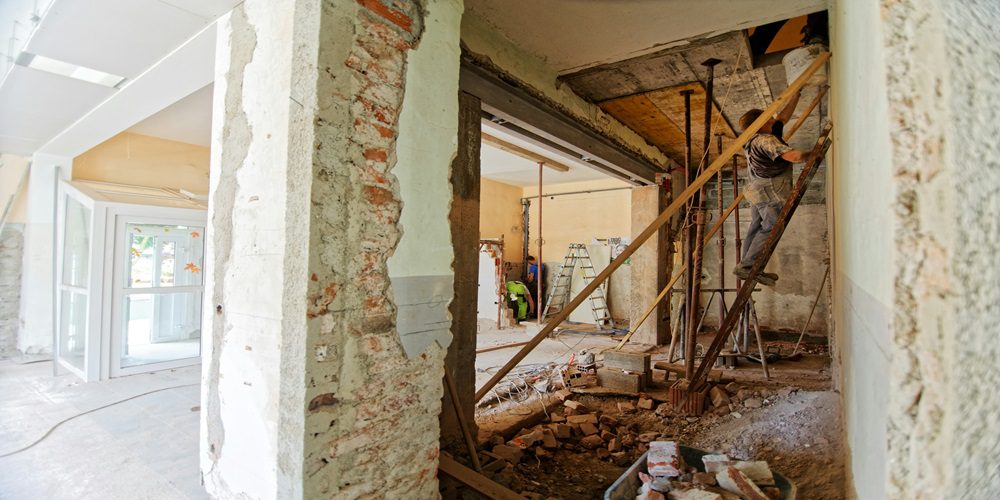Welcome to our blog! If you’re planning any kind of home improvement project, we understand that finding the right contractor can be a daunting task. But worry not! In this guide, we’ve got your back. We’ll walk you through the process of selecting the perfect contractor who will turn your dreams into reality. From checking credentials and past projects to ensuring open communication and staying within budget, we’re here to empower you with practical tips and expert advice. So, let’s dive in and get ready for an exciting journey towards achieving your dream home!
Introduction: Why Hiring the Right Contractor for Your Home Improvement Project is Crucial
Undertaking a home improvement project can be an exciting and daunting experience at the same time. It involves investing your time, money and efforts to transform your living space into something more functional and aesthetically pleasing. However, one of the most crucial decisions you will have to make during this process is hiring the right contractor for the job. The success or failure of your home improvement project largely depends on their skills, expertise, and reliability.
While it may be tempting to cut corners and save some money by hiring an inexperienced or unqualified contractor, it can quickly lead to disastrous consequences. From shoddy workmanship to extensive delays and unexpected costs, choosing the wrong contractor can turn your dream renovation into a nightmare.
Understanding Your Needs: Assessing Your Home Improvement Goals and Budget
When embarking on a home improvement project, it is important to understand your needs and assess your goals and budget before hiring a contractor. This will help you determine the scope of work and find a contractor who can meet your expectations within your financial constraints. In this section, we will discuss the key aspects of understanding your needs and assessing your home improvement goals and budget.
Firstly, take some time to think about why you want to make improvements in your home. Is it to increase the value of your property? Do you need more space for a growing family? Are there specific functionality or design improvements that you have been wanting for some time? Understanding the purpose behind your home improvement project will guide you in selecting the right contractor who specializes in the type of work you require.
Next, define your specific goals for the project. This could include a list of improvements needed in each room, deadlines for completion, any desired aesthetic changes, and so on. With clear goals in mind, you can effectively communicate with potential contractors and ensure that they are able to deliver what you envision.
Once you have identified your needs and set realistic goals for the project, it is crucial to assess your budget. Begin by determining how much money you are willing to invest in the project. It is advisable not to stretch yourself too thin financially as unexpected costs may arise during construction. Consider obtaining quotes from different contractors to get an idea of how much the project may cost.
In addition to setting a budget for the entire project, it is also important to allocate funds for potential unforeseen expenses such as structural repairs or unexpected upgrades. Communicate these concerns with potential contractors beforehand so they can provide accurate estimates.
Another factor to consider while assessing your budget is financing options available for home improvement projects such as loans or lines of credit. These options can help cover costs that may exceed an initial budget plan without compromising on quality materials or workmanship.
Researching Potential Contractors: How to Find Qualified and Reputable Professionals
When taking on a home improvement project, finding the right contractor is crucial. Not only do you want someone who is skilled and knowledgeable in their craft, but you also want someone who is trustworthy and reputable. This makes researching potential contractors an essential step in the process.
Here are some helpful tips on how to find qualified and reputable professionals for your home improvement project.
1. Ask for recommendations: One of the most reliable ways to find a good contractor is through word-of-mouth recommendations from friends, family, or neighbors who have had their own successful home improvement projects. They can provide first-hand insights into the contractor’s workmanship, professionalism, and overall experience.
2. Check online reviews: In this digital age, it’s easier than ever to research and gather information about contractors. Online review platforms like Google Reviews, Yelp, and Angie’s List allow users to leave feedback about their experiences with different contractors. Reading these reviews can give you an idea of what previous clients have to say about their services.
3. Look for credentials: A qualified contractor should possess all necessary licenses and certifications required by your state or local government. You can also check if they are affiliated with any professional organizations relevant to their field of expertise as this shows a commitment to upholding standards of quality in their work.
4. Request references: Don’t be afraid to ask potential contractors for references from past clients you can speak with directly. Talking to these references will give you a better understanding of what working with that specific contractor was like and whether they would recommend them.
5. Conduct interviews and get estimates: Once you have narrowed down your list of potential contractors, schedule interviews or consultations with each one before making a final decision. These meetings serve as an opportunity for you to discuss your project in detail and ask any questions about the contractor’s experience, availability, payment schedules, insurance coverage etc.
6. Trust your gut feeling: While it’s essential to consider credentials and past experiences when choosing a contractor, it’s also crucial to trust your instincts. If you feel uncomfortable or uneasy about a particular contractor, it may be best to continue your search.
Interviewing Candidates: Questions to Ask and Red Flags to Look Out For
Interviewing potential contractors for your home improvement project is a crucial step in ensuring the success of your renovation. It allows you to gather important information about their skills, experience, and qualifications while also giving you a chance to assess their personality and communication style. However, the key to conducting a successful interview is asking the right questions and being aware of any red flags that may arise during the conversation. In this section, we will discuss some essential questions to ask and red flags to watch out for when interviewing candidates for your home improvement project.
Questions to Ask:
1. Can you provide references from previous clients?
Asking for references is an excellent way to gain insight into the contractor’s past projects and how satisfied their clients were with their work. Contacting these references can help you get a better understanding of the contractor’s work ethic, quality of work, and adherence to deadlines.
2. What is your experience with projects like mine?
It’s essential to choose a contractor who has experience in similar projects as yours. This will give you confidence that they have the necessary knowledge and skills to handle your specific needs.
3. How do you handle unexpected problems or changes during a project?
Home improvement projects are unpredictable, so it’s vital to choose a contractor who can handle unforeseen challenges with ease. Their response will give you an idea of how well they can adapt and think on their feet if something unexpected occurs during your project.
4. Are you licensed and insured?
A reputable contractor should be properly licensed by the state in which they operate, as well as carry insurance for both property damage and worker’s compensation. Valid licenses ensure compliance with local regulations, while insurance coverage protects against potential liability issues.
Red Flags:
1. Lack of communication or unresponsiveness
If the contractor takes days (or even weeks) before responding to emails or phone calls or fails to show up for scheduled appointments without notice, it can be taken as a sign of poor communication skills. This could lead to delays or misunderstandings during the project.
2. No written contract or vague estimates
A reliable contractor should provide a detailed and well-written contract that outlines the scope of work, timeline, materials to be used, and payment terms. Be wary of contractors who only provide vague estimates or refuse to put everything in writing.
3. Unwillingness to provide references
If a contractor is hesitant to give you references from previous clients, it could be an indication that they have something to hide or do not have enough experience.
4. Pushy sales tactics
Be cautious if a contractor is trying to pressure you into making quick decisions or encouraging you to take on additional work that was not initially discussed. This can be a red flag for potential hidden costs and a lack of consideration for your budget.
Checking Credentials and References: Ensuring the Contractor Has the Necessary Licenses and Experience
Choosing the right contractor for your home improvement project is crucial to the success and quality of the final result. One key aspect that should not be overlooked during this process is checking the credentials and references of potential contractors. This step is important in ensuring that the contractor has the necessary licenses, experience, and qualifications to carry out your project.
First and foremost, it is essential to check if the contractor holds a valid license for their specific trade. A license serves as proof that they have met all legal requirements and have undergone proper training in their field of work. It also ensures that they are aware of building codes, safety regulations, and other laws related to construction in your area. Without a license, a contractor may not possess the required skills or knowledge to complete your project successfully.
In addition to a valid license, it is also vital to check if the contractor has relevant experience in similar projects. Each home improvement project comes with its unique set of challenges and requires specific expertise. Therefore, it is crucial to hire a contractor who has successfully completed similar projects in the past. Ask for evidence such as before-and-after photos or client testimonials to determine their level of experience.
When checking references, ask for at least three recent clients whom you can contact directly. Speaking with these references will give you valuable insights into how well the contractor communicates, problem-solves, stays on budget and schedule, and deals with any unexpected issues that may arise during construction. You can even ask about overall satisfaction with the finished project and if they would hire them again for future projects.
It might be tempting to accept recommendations from friends or family members without conducting proper research yourself because someone close recommended them highly does not guarantee their credibility or expertise. Be sure always to conduct thorough research on any potential contractors regardless of recommendations given by people you trust.
Another source worth considering when checking credentials is professional associations or organizations related to construction industries such as national associations like National Association of the Remodeling Industry or local organizations like your state’s Home Builders Association. Contractors who are members of these associations often adhere to a code of ethics and have access to ongoing education opportunities.
Getting a Written Estimate: Breaking Down the Cost of Your Project and Avoiding Hidden Fees
One of the most important aspects of choosing the right contractor for your home improvement project is getting a written estimate. This document will not only outline the overall cost of your project, but it will also break down each individual expense and help you avoid any hidden fees or unexpected costs.
The first step in obtaining a written estimate is to have a detailed discussion with potential contractors about your project. This should include specific details such as the scope of work, desired materials, and any unique features or requests. The more information you can provide, the more accurate and comprehensive your estimate will be.
Once you have discussed all aspects of your project with potential contractors, you should receive a written estimate from each one. It is essential to carefully review these estimates and understand each itemized cost. In some cases, contractors may use industry-specific terminology or abbreviations that may not be familiar to homeowners. If you are unsure about any line items on the estimate, don’t hesitate to ask for clarification from the contractor.
It’s also crucial to make sure that both parties agree on what is included in the estimated cost. Some contractors may offer low initial estimates but then add on additional charges throughout the project for items that were not explicitly stated in the original agreement. To avoid this situation, make sure that both parties sign off on a finalized contract before beginning any work.
Additionally, when reviewing an estimate, be wary of vague or broad statements, such as “materials” or “labor.” Instead, look for specific details such as brands and quantities of materials needed and an estimated number of hours or days required for labor. Having these specifics outlined will help prevent miscommunications and ensure that there are no surprises when it comes time for payment.
In addition to having itemized expenses clearly outlined in your written estimate, it’s essential to discuss potential unforeseen costs upfront with your chosen contractor before signing any contracts. For example, if there’s a possibility that asbestos might be discovered during the renovation process, it’s crucial to discuss this potential cost and how it would be handled beforehand. This will help you avoid any significant financial shocks or disputes down the road.
Conclusion
Choosing the right contractor for your home improvement project is crucial to ensuring a successful outcome. We hope these tips have helped you understand what factors to consider when making this decision. Remember, communication, experience, and reputation are key elements to look for in a contractor. Take the time to do thorough research and don’t rush into hiring the first one you come across. With the right contractor on your team, your dream home improvements can become a reality. Good luck!



































